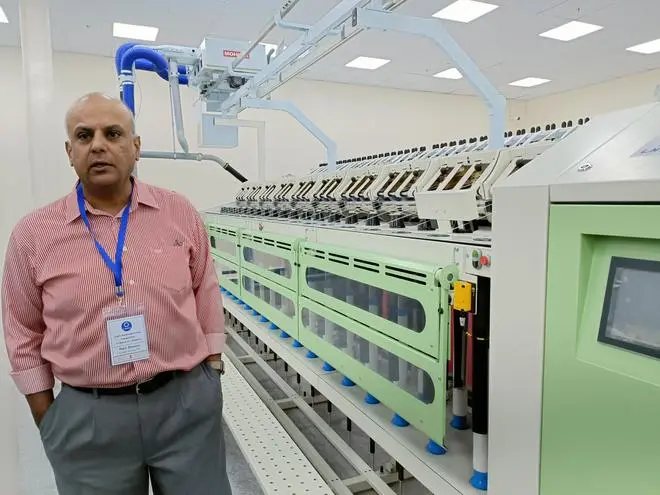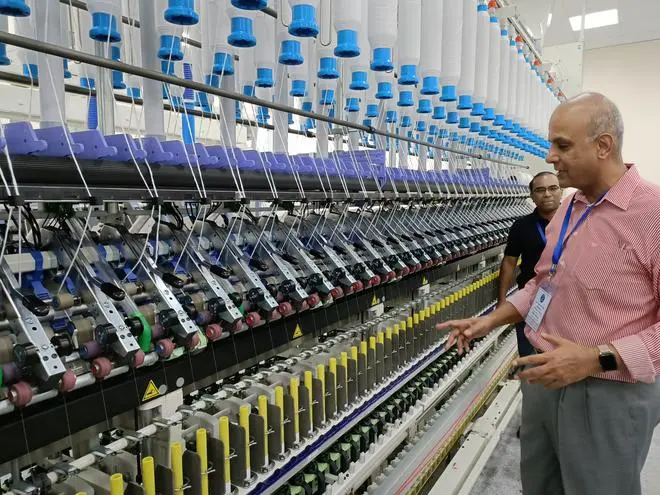Coats, a leading manufacturer in thread and structural components for apparel and footwear, on Wednesday inaugurated its sustainability hub in Madurai. The hub - a spinning and twisting pilot plant - will work alongside the Coats Sustainability Hub in Shenzhen, China, to accelerate the material transition to recycled and renewable materials. The company has similar labs in Turkey and the US.
The hubs at Madurai and Shenzhen will work together to innovate new generation materials for sustainable sewing threads for apparel, footwear and performance materials. This material transition journey is fundamental to the delivery of Coats’ emission reducing targets. This is part of a $10-million investment planned over the next five years in scaling up the development of green technologies and materials, Rajiv Sharma, Group Chief Executive, Coats.

Rajiv Sharma, Group Chief Executive, Coats, at the newly inaugurated Coats Sustainability Hub India in Madurai. | Photo Credit: TE Raja Simhan
Nearly 70 per cent of the shareholders of the 260-year-old London Stock Exchange-listed company have their core philosophy on sustainability, he told newspersons in Madurai.
The Madurai hub will support customers and other stakeholders in creating sustainability in the industry. This will enable Coats to streamline sustainability, innovation, enhance brand collaborations and facilitate faster sustainable product offers and market entry capabilities. “Every day, we plan to test 75 kg of new product samples of recycled and renewable material at the innovation lab,” he added.
Recycled polyester thread

Rajiv Sharma, Group Chief Executive, Coats, at the newly inaugurated Coats Sustainability Hub India in Madurai. | Photo Credit: TE Raja Simhan
Sharma said one of the Coats most premium products in the thread is EPIC. The company started with recycled polyester in 2019. It then had just two suppliers of recycled polyester and did about $2 million of sales that year. The issue then was supply due to lack of suppliers to provide quality recycled polyester.
“We worked hard to develop suppliers across the world. As of last year, we had 21 qualified suppliers and today supply is not the issue. We did about $128 million of sales of recycled polyester thread last year. From $2 million in 2019 to $128 million last year; $225-250 million this year and get to nearly $400 million next year,” he said.
By 2030, everything may come from either recycled or renewable and new generation materials like wood pulp, corn, bamboo shoots and banana skin for making the threads. That’s the path and the scaling up is happening at a fast pace, he said.
“Even though the raw materials are more expensive, we are going to take lower profits in the short term but make sure that we need this material transition in the industry,” he said.
Explaining the rationale behind the initiatives on sustainability, Sharma said that the top 50-60 global brands with which the company interacts with, have all sustainability targets. They want all their suppliers to supply materials that are sustainable. The brands are incentivising their designers to design products leading to circularity, and it should be biodegradable and recyclable, he said. The current generation is also very savvy on issues like sustainability, he added.
The top brands are active in the area of sustainability and Coats as a leading supplier of threads are absolutely engaged with them, he said.
The industry consumes a lot of water, electricity, chemicals and labour intensive in the making of the garment. For instance, nearly 150 litres of water is used to make 1 kg of thread. “We make enough thread to go to the moon and come back every three hours,” he said. Nearly 700 litres of water is required to make a jean, he said.
Revenue
Sharma expects more revenue contribution from its Indian arm. At present, the Indian arm contributes to 10-11 per cent of the Coats’ $1.6 billion revenue. Tamil Nadu contributes to nearly 60 per cent of India’s manufacturing capacity. “My wish is that India has the potential to contribute 16-18 per cent of global revenue in the next two to three years,” he said.
The global addressable market for apparel and footwear threads ($4.2 billion) and structural performance material ($1.8 billion), he said.
Read also: Polyester yarn makers to see 15-20% rise in operating profit in FY21
(The trip to Madurai for this writer was sponsored by Coats)





Comments
Comments have to be in English, and in full sentences. They cannot be abusive or personal. Please abide by our community guidelines for posting your comments.
We have migrated to a new commenting platform. If you are already a registered user of TheHindu Businessline and logged in, you may continue to engage with our articles. If you do not have an account please register and login to post comments. Users can access their older comments by logging into their accounts on Vuukle.